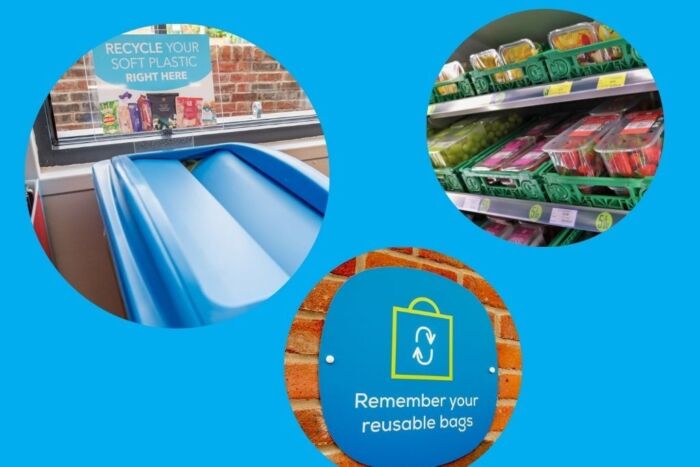Waste management

We are committed to reducing waste across our operations and minimising food waste through innovative solutions and community partnerships.
We’re aiming to achieve zero waste to landfill by the end of the 2028 financial year.
We’re working on…
- Reducing waste
- Minimising food waste
- Managing water waste
Our achievements so far…
Soft plastic recycling bins across all our food stores
These bins mean our communities can dispose of materials such as bread bags or chocolate wrappers in an environmentally friendly way.
The soft plastics we collect in our stores will be recycled in the UK. They are turned into plastic granules which are then made into things including bin liners, rigid products such as buckets, and materials for the construction industry.
100% easily recyclable packaging
100% of packaging from Co-op own brand products are easily recyclable – that’s defined as recycled by at least 75% of local authorities nationally.
We report how many products have easily recyclable packaging, whereas many other organisations base their recycling targets on weight. We believe weight doesn’t show the true picture – for example, glass, which is widely recycled, is heavier than many plastics.
Initiatives have been introduced such as switching polystyrene pizza bases to cardboard and simplifying trays used for meat and fish so that they’re made from just one type of plastic.
Alongside this, Co-op own brand still, sparkling, flavoured water, carbonated drinks and mixers are made out of 100% recycled material.
Restricted waste to landfill
Materials such as food, paper, cardboard, plastics, medicines, or equipment such as computers and phones are diverted from landfill in a number of ways, including being reused, recycled, composted, or sent to energy recovery.
However, we’re not complacent and our main focus is on reducing the volume of waste we produce.
Supporting food redistribution
We work alongside charity FareShare to support food redistribution across Lincolnshire. Fareshare work to redirect food that otherwise would go to waste so it can be used to support people in need.
We also trialled donating surplus food to FareShare, however we have very low levels of food surplus and this proved to be unsustainable. We are currently looking for alternative solutions.
Our Community Champions scheme has also supported local groups and good causes that enable food redistribution, such as Mint Lane Café in Lincoln and Wragby Chef.
Clothing banks at 54 sites
Our Salvation Army clothing banks mean that our communities can easily recycle unwanted garments.
Between April 2024 and March 2025 we’ve recycled over 343,000 kilograms of clothing and raised thousands of pounds for both The Salvation Army and our own Community Champions fundraising.
2.8 tonnes of batteries recycled in a year
All of our food stores offer battery recycling.
Putting batteries in normal general waste or recycling bins creates a fire risk for bin lorries and recycling centres. Not only is using our recycling bins safer, it’s also better for the environment!
So, store up your used batteries and take them to your local food store next time you’re shopping.
All information correct and up to date as of July 2025.
